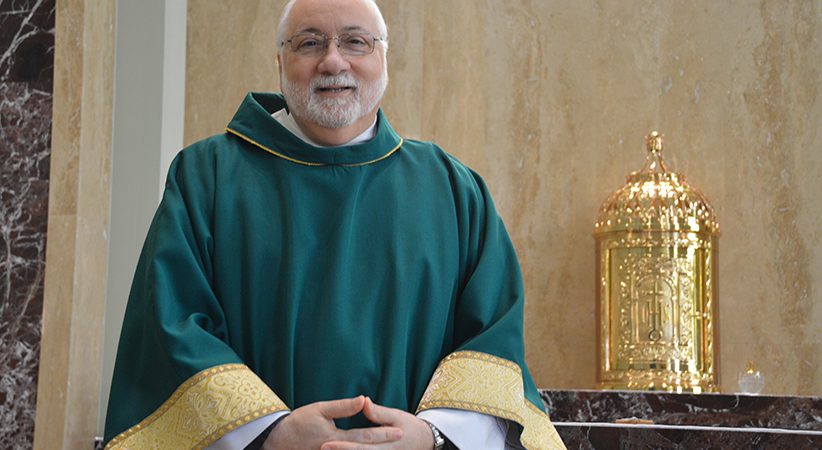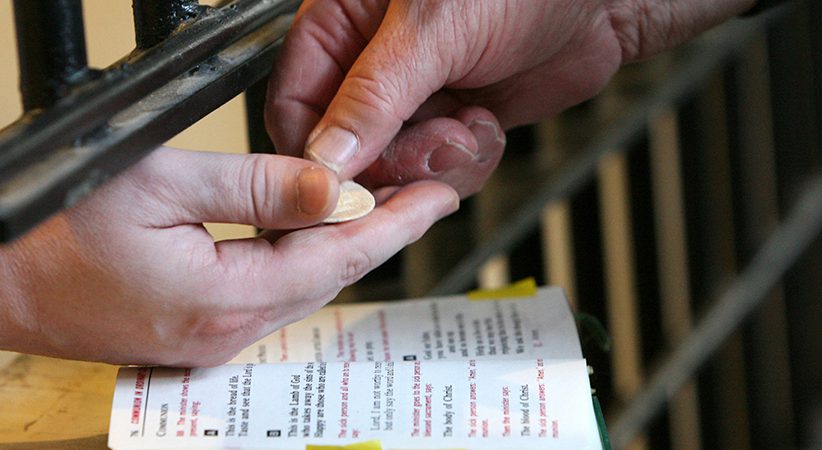Empathy in Diaconal Ministry
Deacon Dominic Cerrato 1
Perhaps one of the most essential qualities of diaconal ministry is the gift of empathy. In its most basic sense, empathy concerns the ability to recognize and enter into the experience of another. The term is grounded in the Greek prefix “em,” meaning “in,” and the word “pathos,” meaning “suffering.” This implies a deeply personal sharing in another’s hardship such that the one empathizing experiences, in a certain sense, the hardship of the other. Empathy creates a bond between the two accompanying the sufferer as he carries his cross, reminding him that he is not alone and that someone cares. It is, in this respect, nothing less than an act of love.
The object of authentic empathy is not so much the suffering of the other, but the other himself. Empathy is, at its core, an interpersonal reality. In this regard, by being empathetic we accompany the sufferer through his suffering. This may seem, in a world dominated by positive action, to be feeble and ineffective. To sit by a hospital bed or to spend time with someone with mental illness or to simply visit a person who has lost a loved one may seem rather futile considering the sickness, illness or loss. However, a comforting presence, one that takes on the suffering of the other by just being there and listening quietly, brings a consolation that enables the sufferer not only to endure, but to rise above the hardship experiencing its redemptive value.
Jesus is the perfect model of empathy. By virtue of his incarnation, he enters into the human condition with all of its suffering. Not content to be a bystander dispassionately removed from human pathos, he takes on humanity’s suffering through his passion, death and resurrection.
Deacon James Keating, in his book “The Heart of the Diaconate,” writes, “Empathy will only remain and deepen over many decades of ecclesial service if that empathy is sourced in Christ and restored in him when human strength, interest and generosity lag.”
While the fullness of God’s grace subsists in the Catholic Church (see Lumen Gentium, No. 8), the finite Church cannot contain the infinite nature of God’s grace. We see this in the many examples of the noble atheist whose selfless altruism inspires others. Nonetheless, it is often the case that love of man, without the corresponding love of God, renders the noble atheist incapable of sourcing his love beyond himself. True, his love ultimately is a limited participation in divine love, but it is rooted in a God he does not know, and so he cannot draw from him, be inspired by him, be strengthened in him.
However, when a deacon roots his ministry in the love of Christ the Servant, he understands empathy in light of the Paschal Mystery and its personal promise of salvation. This not only allows for a wider perspective, but it understands empathy from Calvary to the empty tomb. It understands that, often, empathy is more about being at the foot of the cross with the one who suffers awaiting the Resurrection rather than doing something. This being with the sufferer is not the absence of ministry but, many times, the very best kind of ministry.
All effective ministry is based on empathy, be it episcopal, presbyteral, diaconal or lay. A ministry that lack’s empathy not only is radically incapable of seeing the crucified Christ in the sufferer but, likewise, radically incapable of witnessing the resurrected Christ to that same sufferer. Here, the minister will fail to bring hope to a soul in desperate need of the healing love of Jesus Christ. Beyond this, when we share in the sufferings of others, they reveal to us their desires, and because of this, we can respond to their specific needs and not what we think their needs happen to be.
Because of our fallen nature, we struggle to be empathetic in our lives and in our ministry. To become more empathetic, we must turn to the one who is empathy himself: Jesus Christ. St. John reminds us that we are capable of love because God loved us first (see 1 Jn 4:19). If empathy is an expression of love, then we are capable of being empathetic because of the empathy shown to us by Our Lord. Consequently, we must source and restore our empathy in Jesus by prayerfully reflecting on his Incarnation, passion, death and resurrection.
One way to do this practically is by reflecting upon a crucifix. This symbol of our Holy Catholic faith is a representation of an act of divine love by which all other loves are measured. Because empathy is an expression of love, the cross also is an act of empathy by which all other acts of empathy are measured. When we meditate on the cross in a personal sense — when we see in this timeless eternal sacrifice a God willing to enter into our sufferings such that we no longer suffer alone — we are filled with awe and gratitude. It is this awe, this gratitude, that then enables us to appropriate God’s own love, participate in it and express it in an empathetic way to those around us.
In all of this, it should be recognized that to be a deacon is to grow in empathy. Progress in the interior life, growth in intimacy with Christ the Servant, can be measured by the extent to which we express empathy to others. Jesus said, “By this all men will know that you are my disciples, if you have love for one another” (Jn 13:35). Diaconal ministry, expressed in empathy, bears witness to a divine love giving hope to those who suffer. It moves suffering beyond the mere endurance of pain giving it a redemptive quality. It does so by enabling the sufferer to offer up his imperfect sacrifice in union with the perfect sacrifice of Christ Jesus our Lord.
Deacon Cerrato is editor of Deacon Digest magazine.




Comments are closed.